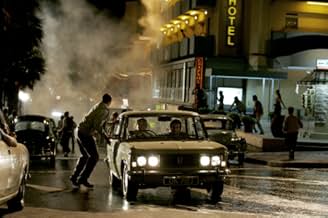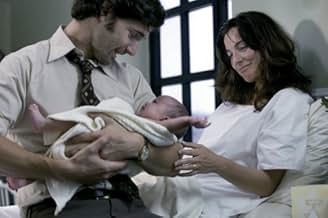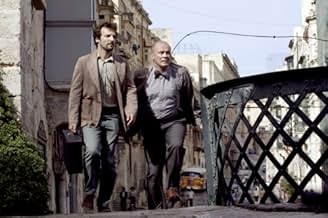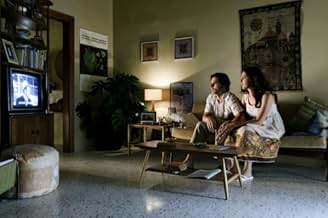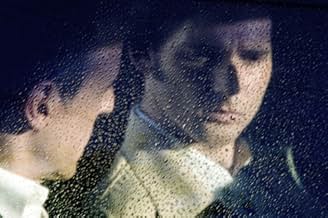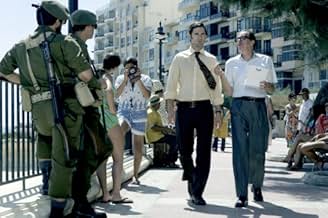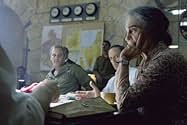ब्लैक सितंबर की घटना के लिए जिम्मेदार लोगों को खत्म करने के लिए बनी पांच लोगों की टीम की सच्ची कहानी पर आधारित और वह कैसे उस मकसद को अंजाम देते है.ब्लैक सितंबर की घटना के लिए जिम्मेदार लोगों को खत्म करने के लिए बनी पांच लोगों की टीम की सच्ची कहानी पर आधारित और वह कैसे उस मकसद को अंजाम देते है.ब्लैक सितंबर की घटना के लिए जिम्मेदार लोगों को खत्म करने के लिए बनी पांच लोगों की टीम की सच्ची कहानी पर आधारित और वह कैसे उस मकसद को अंजाम देते है.
- निर्देशक
- लेखक
- स्टार
- 5 ऑस्कर के लिए नामांकित
- 14 जीत और कुल 75 नामांकन
Marie-Josée Croze
- Jeanette the Dutch Assassin
- (as Marie-Josee Croze)
Valeria Bruni Tedeschi
- Sylvie
- (as Valéria Bruni Tedeschi)
Amos Lavi
- General Yariv
- (as Amos Lavie)
फ़ीचर्ड समीक्षाएं
Steven Spielberg has absolutely everything at his disposal, he can make an epic in no time at all. But, even he must know that films, most films have a soul and that can't be rushed. Why the need to rush this film into screens? For Oscar consideration? If there was a film that needed nurturing and thought was this one. The length is a flaw in itself. It makes it appear self indulgent and, quite frankly,annoying. If one could, and one should, put that aside, "Munich" is a remarkable experience. Tony Kushner and Eric Roth deal with people in all its complexity - a welcome new detail in a Spielberg film - and that gives "Munich" its most powerful aspect. Eric Bana is extraordinary and the humanity of his gaze is confusing and recognizable at the same time. His crying at hearing his child's voice over the phone is as real as his hardness when he massacres his targets. The controversy raising after the first public screenings seems pre-fabricated by a marketing machine. The questioning of Bana's character and the appalling nature of revenge can't be controversial it's at the base of human nature. To call Spielberg "no friend of Israel" is as absurd as it is suspicious. No, this movie is a thriller, based on actual events, directed by the greatest craftsman of the last 30 years in a record amount of time. Go see it.
7e-20
Munich is a well crafted film by the biggest director on the planet. Great pacing, suspense and cinematography. The biggest problem I had with the film is that I've seen it before. A little known film called THE SWORD OF GIDEON. Munich is almost a direct copy from the original. What a shame that Spielberg has to produce a remake of a much better film. Enough already with the remakes. People want to see original stories with fresh new ideas and writers. Why are independent films so successful, because the ones that are well made and tell a good story are box office darlings. It's amazing some Hollywood films have budgets north of 100 million. Just incredible how much money and time is wasted. If you want to understand what happened in the aftermath of Munich, rent THE SWORD OF GIDDEON.
Ever since he has journeyed into serious films (starting with "Empire of the Sun" and then "Schindler's List"), Steven Spielberg has been searching for a method of making violence unattractive to moviegoers. "Schindler's List" was, of course, shocking, but this first attempt at strong violence did not quite have the intended effect. I know that a lot of people (including me) feel saddened by the film, but SL's violence could seem distant at times, like the audience was merely an observer. "Saving Private Ryan" was the second great attempt at making moviegoers detest violence, but this seemed easily dismissed as a war film, showing events that would probably never happen again, like showing violence in a distant universe. Munich is his latest effort, and it shows Spielberg's feeling that his previous films, although progressive, had not quite 'hit the mark'.
The violence shown in Munich is, perhaps, the most brutal realistically intentioned violence ever shown on film. I say 'realistically intentioned' because, like the average moviegoer, I have not witnessed people getting shot or blown up, so I don't know what those events would actually look like. There are many signs in the film that Spieberg is trying to improve on his earlier efforts. The guns in the film are REALLY loud when fired. This has the effect of putting you in the fight, making it more intimate when someone IS shot. The bullet wounds and remains after explosions are quite gruesome. When someone dies in this film, no matter what side they are on, you feel no happiness, no relief or awe. You feel a sense of death, nothing dramatic, just blank and empty. For this reason, Munich is one of the most important films to have come out, and perhaps it is Spielberg's best ('Raiders' is too superhuman to be included on that list). Spielberg deserves the best director for this one.
The violence shown in Munich is, perhaps, the most brutal realistically intentioned violence ever shown on film. I say 'realistically intentioned' because, like the average moviegoer, I have not witnessed people getting shot or blown up, so I don't know what those events would actually look like. There are many signs in the film that Spieberg is trying to improve on his earlier efforts. The guns in the film are REALLY loud when fired. This has the effect of putting you in the fight, making it more intimate when someone IS shot. The bullet wounds and remains after explosions are quite gruesome. When someone dies in this film, no matter what side they are on, you feel no happiness, no relief or awe. You feel a sense of death, nothing dramatic, just blank and empty. For this reason, Munich is one of the most important films to have come out, and perhaps it is Spielberg's best ('Raiders' is too superhuman to be included on that list). Spielberg deserves the best director for this one.
This movie relates more than just a story of "Vengeance". Besides proving that killing begets killing - it consists of numerous fine details that reveal the hard work done at getting to the depth of things:
For instance, only characters that get shot in the head slump to the ground. The rest take time to die - they walk a few steps, spurt blood and express a look of helplessness and inevitability before going out. Yes its horrifying to look at, which is the point, but it is also real.
Every character is different, and though common in their desire for vengeance, their temperaments are clearly distinguishable in the way the hit men approach their task. Even the terrorists are not stereotyped into hysterical, screaming lunatics. They range from the visibly nervous to the cool Abu Salameh with the movie star style. They are poets, intellectuals and guerrillas each with his story of the conflict. They speak passionately about home - a recurring theme, along with "family". Moreover, Spielberg does not attempt to mitigate the grotesque manner of their deaths, for the blood of the targeted men flows as freely as that of their victims - and when they are blown up, their body parts dangle from ceiling fans. You are not here to feel satisfaction over anyone's death, Spielberg says to the audience. Or as Caine would say in Kung Fu: "The taking of a life does no one honour."
There are no easy "shoot-em-dead" eliminations. There are neighbors, bystanders and obstacles that must be avoided and protected - with variable success. Innocent people may be harmed - and one has to live with that.
There are no mathematical certainties about the potential damage a bomb will cause.
Perspectives and convictions can change, sometimes regrettably. "Don't think about it - just do it" says Avner at one stage when a member of the team expresses doubts about a target's guilt. But at the end he wants evidence that the men he despatched were justifiably killed. Implausible? No; it is only when he has been reunited with his family and experiences the affection of wife and child that he allows himself to reflect from a different perspective - their targets had families too - what if he had killed the wrong men?
The paranoia that permeates the world of spies and assassins is built up gradually - to the point where every survivor mistrusts everybody else. One is doomed all one's life to walk with ears strained for following footsteps. The length of the movie creates the right atmosphere for this idea.
The end dissatisfies many because they would like a reassurance, a note of optimistic finality - but Spielberg rightly offers none. It would be dishonest of him to offer a false but comforting illusion.
It is interesting to contrast this movie with "Paradise Now" that has no violence, a modest budget, and views the conflict from the Palestinian camp. Both narrate completely different stories - yet, in their respective ways, both humanize their subjects, defuse myths about glory, and arrive at the same conclusion: "There's no peace at the end of this."
For instance, only characters that get shot in the head slump to the ground. The rest take time to die - they walk a few steps, spurt blood and express a look of helplessness and inevitability before going out. Yes its horrifying to look at, which is the point, but it is also real.
Every character is different, and though common in their desire for vengeance, their temperaments are clearly distinguishable in the way the hit men approach their task. Even the terrorists are not stereotyped into hysterical, screaming lunatics. They range from the visibly nervous to the cool Abu Salameh with the movie star style. They are poets, intellectuals and guerrillas each with his story of the conflict. They speak passionately about home - a recurring theme, along with "family". Moreover, Spielberg does not attempt to mitigate the grotesque manner of their deaths, for the blood of the targeted men flows as freely as that of their victims - and when they are blown up, their body parts dangle from ceiling fans. You are not here to feel satisfaction over anyone's death, Spielberg says to the audience. Or as Caine would say in Kung Fu: "The taking of a life does no one honour."
There are no easy "shoot-em-dead" eliminations. There are neighbors, bystanders and obstacles that must be avoided and protected - with variable success. Innocent people may be harmed - and one has to live with that.
There are no mathematical certainties about the potential damage a bomb will cause.
Perspectives and convictions can change, sometimes regrettably. "Don't think about it - just do it" says Avner at one stage when a member of the team expresses doubts about a target's guilt. But at the end he wants evidence that the men he despatched were justifiably killed. Implausible? No; it is only when he has been reunited with his family and experiences the affection of wife and child that he allows himself to reflect from a different perspective - their targets had families too - what if he had killed the wrong men?
The paranoia that permeates the world of spies and assassins is built up gradually - to the point where every survivor mistrusts everybody else. One is doomed all one's life to walk with ears strained for following footsteps. The length of the movie creates the right atmosphere for this idea.
The end dissatisfies many because they would like a reassurance, a note of optimistic finality - but Spielberg rightly offers none. It would be dishonest of him to offer a false but comforting illusion.
It is interesting to contrast this movie with "Paradise Now" that has no violence, a modest budget, and views the conflict from the Palestinian camp. Both narrate completely different stories - yet, in their respective ways, both humanize their subjects, defuse myths about glory, and arrive at the same conclusion: "There's no peace at the end of this."
Another dip in the Spielberg pool and I come away drenched in emotion. I was a freshman in high school in Texas during the Munich games. I was stunned by the events and understood little.
Today, I am still stunned by Munich and every terrorist act that followed, but I understand so much more and grieve. Spielberg gives us a powerful glimpse into the meaning of home, family, honor, history, ethics, and faith. The movie is not about the Jews and Arabs. It's about human beings. It's about us.
The narrative is driven by our connection to Avner. We watch as Eric Bana opens himself up in a way that the likes of a George Clooney in Syriana only dreams of.
This is a must see.
Today, I am still stunned by Munich and every terrorist act that followed, but I understand so much more and grieve. Spielberg gives us a powerful glimpse into the meaning of home, family, honor, history, ethics, and faith. The movie is not about the Jews and Arabs. It's about human beings. It's about us.
The narrative is driven by our connection to Avner. We watch as Eric Bana opens himself up in a way that the likes of a George Clooney in Syriana only dreams of.
This is a must see.
क्या आपको पता है
- ट्रिवियाGuri Weinberg played his own father. He is the son of Moshe Weinberg, the Israeli wrestling referee and former champion, who died in the massacre when Guri was just one month old.
- गूफ़Though they took the time to digitally add the World Trade Center to the final shot, they didn't edit out the Citigroup Center, Trump World Tower, and the Bloomberg building, which were built after the time of the movie.
- इसके अलावा अन्य वर्जनThe film was heavily censored in Malaysia for a 'U' rating. The uncut version is rated '18PL'.
- कनेक्शनFeatured in Today: 27 जुलाई 2005 को प्रसारित एपिसोड (2005)
- साउंडट्रैकAin't No Sunshine
Written & Performed by Bill Withers
Courtesy of Columbia Reecords
By Arrangement with Sony BMG Music Entertainment
टॉप पसंद
रेटिंग देने के लिए साइन-इन करें और वैयक्तिकृत सुझावों के लिए वॉचलिस्ट करें
विवरण
- रिलीज़ की तारीख़
- कंट्री ऑफ़ ओरिजिन
- भाषाएं
- इस रूप में भी जाना जाता है
- Untitled 1972 Munich Olympics Project
- फ़िल्माने की जगहें
- Bugibba, माल्टा(Olympic Hotel in Cyprus)
- उत्पादन कंपनियां
- IMDbPro पर और कंपनी क्रेडिट देखें
बॉक्स ऑफ़िस
- बजट
- $7,00,00,000(अनुमानित)
- US और कनाडा में सकल
- $4,74,03,685
- US और कनाडा में पहले सप्ताह में कुल कमाई
- $41,52,260
- 25 दिस॰ 2005
- दुनिया भर में सकल
- $13,09,82,407
- चलने की अवधि
- 2 घं 44 मि(164 min)
- रंग
- ध्वनि मिश्रण
- पक्ष अनुपात
- 2.35 : 1
इस पेज में योगदान दें
किसी बदलाव का सुझाव दें या अनुपलब्ध कॉन्टेंट जोड़ें


